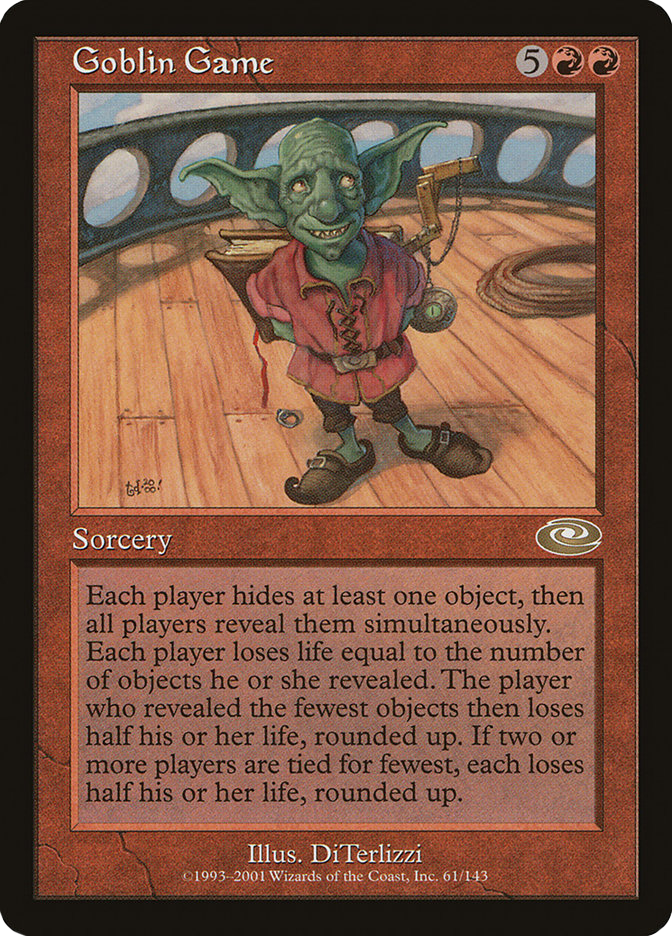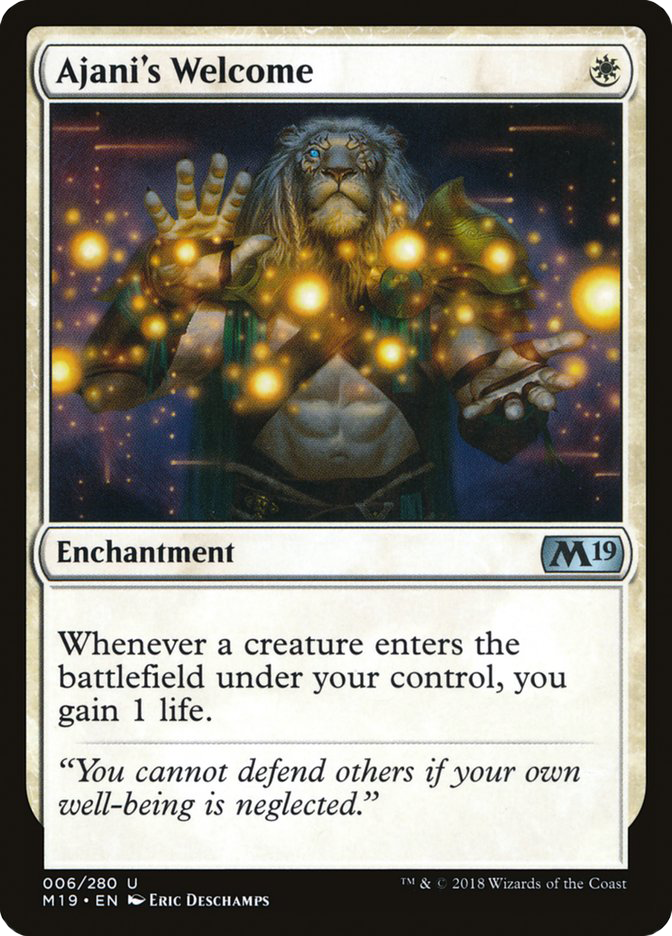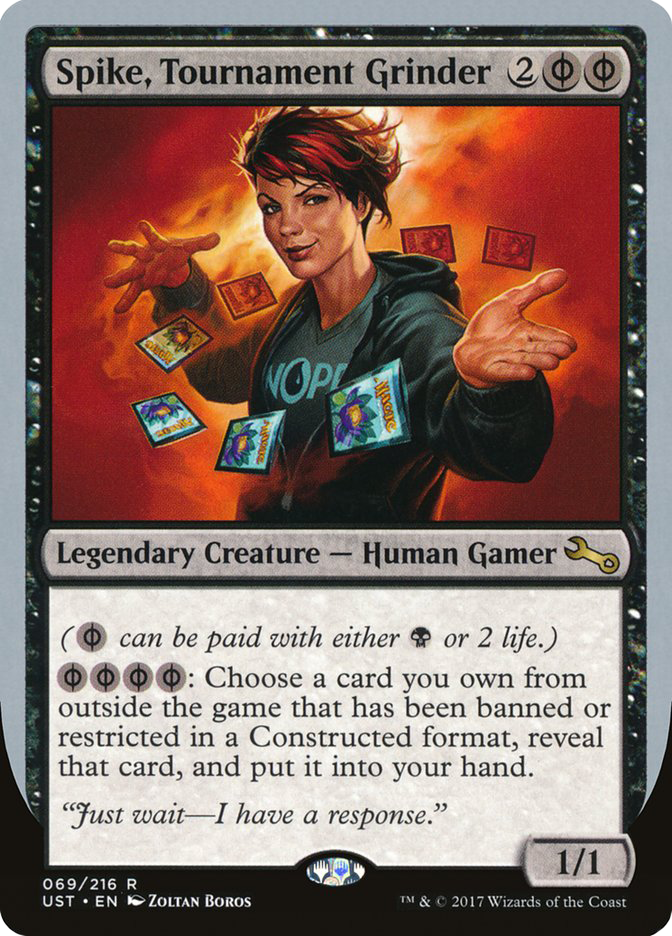Games Are Bad
Okay, let me put that into some context: Many games or cute icebreakers during team meeting introductions or as part of a team-building activity frequently fail to achieve their objectives. Sometimes they can even be counterproductive to your larger goals. (Note: This isn’t a blanket statement – there are plenty of times when these games and other activities are exactly what you need, but they’re not ideal for every context.)
The icebreakers I’m referring to can be questions like “What’s your favorite card in this format?” or “What’s the last book you read?”
Team-building games frequently include challenges like “What’s the largest swing in life totals you saw in one turn?” as a question designed to encourage judges to watch games of Magic, and then develop bonds over them after the round. “Whoever is first to the printer each round wins!” intends to get the pairings team to the printer promptly, with a dose of healthy competition.
These are both things that I see most frequently in new leaders: Trying to help forge bonds and develop the team spirit. However, in practice they also frequently miss the mark.

Goals of a Team Meeting
Let’s take a step back and look at the real goals of the team meeting and introductions.
- Outline the day’s tasks and plan for executing them.
- Make sure everyone knows who everyone else is.
- Lay the groundwork for making sure your team has a good day.
Point one isn’t what we’re going to be talking about today, instead focusing on points two and three. Like with many things I talk about in this series, this isn’t necessarily the “best way” or even the “right way.” Introductions and team meetings are significantly dependent on the team you have, and I’ll be sure to get into some examples towards the end for twists that can work.
Handling Introductions

The way I prefer to run introductions is to start by asking my team for three things. I ask for the same three things every time, because they’re to-the-point and functional, without constraining my team too much, nor putting anyone on the spot (ideally).
-
-
- What do we need to know to communicate with and about you? (This includes name, pronunciation, nicknames, pronouns etc.)
- What goals do you have for the weekend or in the judge program in general?
- What’s something interesting you can tell us that might spark conversation?
-
So why do I ask these questions? What purpose do they serve?
1 The first one is hopefully obvious: Being able to communicate effectively and respectfully with and about one’s peers is important. I make sure to indicate that the name is the only important element – it’s okay to skip any others. I usually skip nicknames, because there isn’t one that I respond to. It’s important to allow this information because some people might not be comfortable sharing their pronouns, and normalizing it and giving the option is important, it’s equally important to not pressure someone into sharing something they’re not ready to share.
2. Next is goals. This allows the team to understand where the individual is, and what they’re trying to do. Someone who is looking for an L2 recommendation is in a different spot in the program than someone who is looking to sharpen their team-lead skills. It can set up an expectation of where everyone is with regards to experience, and what sort of direction they might need.
This is sometimes addressed by asking folks to say what their level is or how many events they’ve worked on, but with objective numbers come complicated feelings. I find that talking about levels or number of events can leave people with a sensation of imposter syndrome or that they should be deferring to experience level. Goals are a little bit more subjective and have the added bonus of letting everyone know how they can support you, which is a great way to get feedback. This root for feedback sets up some of the team dynamics. Frequently I’ll have someone who is interested in pursuing L2 and someone interested in pursuing L3 or other advanced roles. Being able to mentor an L2 candidate is important for advanced roles, and so pairing those people together helps both of them with their goals, while bringing the team closer together. It lets me know who is looking for particular experiences, and who has them, so I can put people in a role that benefits both them and the team as a whole.
3. The third point is how I address more social dynamics. It’s all well and good to maximize execution of the task and encourage judge development, but a large part of the reason many people Judge is because of the Gathering part of Magic. It’s cheesy and a little hokey to say, but true nonetheless.
Some folks pursue this with narrow questions such as the aforementioned “favorite card in the format” or “last book you read.” One of the challenges with these questions is that they don’t always have an answer. Some people don’t enjoy reading and others may not play the format, so they simply don’t have a meaningful answer to the question. Furthermore, what’s the purpose of the question to begin with? You’re trying to tie the team together, and while sometimes a discussion of what are the worst pizza toppings that are commonly available can lead to a great discussion and team bonding, questions like these don’t necessarily spawn further conversation.
Engaging Your Team

Asking a question explicitly about Magic also limits how well you get to know people – we’re already all there for Magic, so you don’t need to go deeper on that. Similarly, if you ask someone about their life outside of Magic – well, there are a lot of judges whose day job is working at an LGS and their favorite hobby is Magic, and so you severely limit their ability to respond.
I make clear that I just want to hear something interesting – I often use the phrase “give me an excuse to come find you later to talk more about it.” I just want to know something you find interesting – it can be associated with judging or not, it can be associated with Magic or not – as long as it’s something that you enjoy talking about, it’s something that I want to hear about. The goal is simply to find a way to engage personally.
And the reason that’s the case is that it ties into the actuality of building the team over the course of the day, outside the introductions. Once the day starts, unless you’re deck checks, you’re not going to be spending anywhere close to the majority of your time in a group with the whole team – you’re going to be scattered across the room answering calls and helping players, so you won’t have any big discussions.
What I prefer to do (and this leans into my quiet and introverted nature) is to have one-on-one conversations with members of my team. I ask them about their goals, and try to push them in the direction of success – I question their motivations and how they’ve learned and do what I can to help them be engaged with the event. I do this over and over, with each person – while they’re not necessarily engaged as a whole team, they are engaged on a personal level, and that leads to a generally positive experience.
Beyond that, I encourage them to talk to each other – if someone said something interesting during introductions, hunt them down. If there’s an L2 candidate who is working on improving their rules knowledge and you just got a question you’d never heard before, find that judge and test them! If two people are close friends, find a way for them to compete, and get them to play off each other. You don’t have to herd everyone at once, you can get them moving one step at a time, in the direction of enjoying the day.
Heck, you can just straight up ask “How’s your day going? How can I make your day better? How can I help you feel more engaged?” It’s not always possible to make someone feel engaged – it’s important to tune your engagement with the needs of your team. Towards the end of 2019, I was leading teams with the same judges day in and day out, week after week after week – we all already knew each other and knew the task, so introductions and team cohesion took on a very different aspect.
Furthermore – sometimes someone is having a rough day, and it has nothing to do with the event, nothing to do with anything you can control or anything they can control. Don’t push people into experiences that they don’t want to have for the sake of “making them have fun.”
For some scenarios, with more outgoing teams, I asked members to introduce someone else, with the same questions as usual. It added a little bit to the team, but that can also very easily be too much gimmick and not enough substance for other judges and other teams.
For some teams the introductions and team briefing were “We did this last week, we did this yesterday, we all know each other… grab some coffee, rest, relax, and charge up for the next twenty minutes before the event starts.”
Games Are Good Sometimes?
But sometimes a little spice is good! There are ways to gamify your day and your task, without it being detrimental to the event. To do so, make sure that whatever you’re doing improves the execution of the task when participants focus solely on their chances to win.
Gamers, in Magic and practically everywhere else, will min-max the fun out of a game. They will maximize things that aren’t fun but are slightly more optimal for winning the game and minimize things that are fun but aren’t good for winning the game.

Similarly, if given a game to help execute a task, Judges, who are by their very nature frequently gamers, will do what they can to win, even if that means letting the task slip – or at the very least, they might feel compelled to do so.
For example, if you want to see who can execute the fastest deck check, corners might be cut. Marked cards might not be examined as thoroughly, and what should be an investigation gets rushed over. The task and the game are at odds with each other, and it already feels bad enough to issue a long extension that adding the motivation of the game can be enough to tip things over into problematic behavior.
Challenging judges to see who can take the most calls means they might rush unnecessarily to tables, but asking to see who can take or shadow the most calls reduces the incentive, but still encourages good behavior.
Asking folks to track the highest life-total swing in a round can get people to find a combo deck, watch it go off, and then stop participating in the challenge. If it’s “what’s the largest number of Planeswalkers you saw in play at once?” the “best” method is to just walk by tables and look strictly for Planeswalkers, not actually watching a game of Magic. Having your team race to the printer can feel weird when participating with End-of-Round – you want to do the task, but you also want to be done with it so you can go to the printer and hang out there for your victory points!
Think about what happens if someone is playing strictly to win whatever mini-game you set out – if playing optimally means judging sub-optimally, consider adjusting your game. If it’s long-running judges might focus on the execution of the game, and not on the task, which is a further loss.
The fundamental goal is to execute the task and make sure that everyone has a good time. The latter can be tricky to achieve in balance with the former, but there are plenty of ways to engage judges.
Think about what your goal is. While tips of “get judges to share something about themselves during introductions” or “have something planned to develop team building for your team” are useful, the underlying challenge is “Make people have fun.” and there is no set of rules that you can follow to ensure that that’s the case. Sticking to any formula for human interaction is a recipe for eventual disaster, so stay adaptable when leading teams.
I am someone who loves games – outside of judging Magic, I play games a lot. I design games. I talk about games. I play games some more. It’s not that games are dumb or that they’re not correct to use, it’s that they can generate a sense of competition and comparison that can lead to weird interactions and things not going right. It’s not that introductions need to be done a certain way or your team dynamics will be ruined, it’s that they can sometimes put people into an awkward place where they feel off base and a little confused.
Really, it’s not that games are actually bad, it’s just that humans are very complicated, very difficult to manage well, especially if it’s people you don’t have an existing relationship with.
And in the meantime, what is the last book you read, and should I read it? Let me know over in the Judge Academy Discord!




